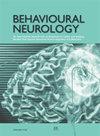The Influence of Depression and Anxiety on Neurological Disability in Multiple Sclerosis Patients
IF 2.7
4区 医学
Q2 CLINICAL NEUROLOGY
引用次数: 10
Abstract
Multiple sclerosis (MS) is a demyelinating disease of the central nervous system (CNS), affecting mostly young-aged people. As a chronic incurable disease, in most cases, it can lead to progressive neurological impairment and severe disability. Depression and anxiety are major distress factors for MS patients, being considerably aggravating elements for their functional capacity. In this study, we analysed the mood disorder distribution and the possible correlations between depression, anxiety, automatic negative thoughts, and MS disability. We took into consideration 146 MS patients, who completed a series of questionnaires: Beck Depression Inventory II (BDI-II), Endler Multidimensional Anxiety Scales-State (EMAS-S), and Automatic Thoughts Questionnaire (ATQ). The Expanded Disability Status Scale (EDSS) was used to measure the neurological disability. Of all patients, 30.1% had symptoms for depression and 11% presented suicidal thoughts. After analysing the correlation index between each variable, we found that there is a mild positive correlation between depression and the EDSS score and between anxiety and the EDSS score. A difference is found in the test scores according to the type of the MS disease. Also, automatic negative thoughts are strongly correlated with depression and anxiety, but do not mediate the path between psychological comorbidities and neurological impairment. Sociodemographic features and interferon-beta treatment were not related to the intensity of the mood disorders. The study suggests that depression and anxiety are frequently encountered among MS patients and these mental disfunctions have an impact on their disability. A proper identification of these risk factors may improve the quality of life for these patients.抑郁和焦虑对多发性硬化患者神经功能障碍的影响
多发性硬化症(MS)是一种中枢神经系统(CNS)脱髓鞘疾病,主要影响年轻人。作为一种慢性无法治愈的疾病,在大多数情况下,它会导致进行性神经损伤和严重残疾。抑郁和焦虑是MS患者的主要困扰因素,是其功能能力的显著加重因素。在这项研究中,我们分析了情绪障碍的分布以及抑郁、焦虑、自动消极思想与MS残疾之间可能的相关性。我们纳入了146名MS患者,他们完成了一系列问卷调查:Beck抑郁量表II (BDI-II), Endler多维焦虑量表状态(EMAS-S)和自动思维问卷(ATQ)。采用扩展残疾状态量表(EDSS)测量神经功能障碍。在所有患者中,30.1%有抑郁症状,11%有自杀念头。在分析各变量之间的相关指数后,我们发现抑郁与EDSS评分、焦虑与EDSS评分之间存在轻度正相关。根据多发性硬化症的类型,测试分数有所不同。此外,自动消极思想与抑郁和焦虑密切相关,但不调解心理合并症和神经损伤之间的途径。社会人口学特征和干扰素治疗与情绪障碍的强度无关。研究表明,多发性硬化症患者经常遇到抑郁和焦虑,这些精神障碍对他们的残疾有影响。正确识别这些危险因素可以改善这些患者的生活质量。
本文章由计算机程序翻译,如有差异,请以英文原文为准。
求助全文
约1分钟内获得全文
求助全文
来源期刊

Behavioural Neurology
医学-临床神经学
CiteScore
5.40
自引率
3.60%
发文量
52
审稿时长
>12 weeks
期刊介绍:
Behavioural Neurology is a peer-reviewed, Open Access journal which publishes original research articles, review articles and clinical studies based on various diseases and syndromes in behavioural neurology. The aim of the journal is to provide a platform for researchers and clinicians working in various fields of neurology including cognitive neuroscience, neuropsychology and neuropsychiatry.
Topics of interest include:
ADHD
Aphasia
Autism
Alzheimer’s Disease
Behavioural Disorders
Dementia
Epilepsy
Multiple Sclerosis
Parkinson’s Disease
Psychosis
Stroke
Traumatic brain injury.
 求助内容:
求助内容: 应助结果提醒方式:
应助结果提醒方式:


